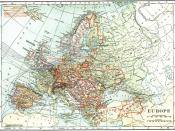In The Circumstances Appeasement Was The Only Realistic Policy
British foreign policy during the 1930s could be called a policy of appeasement. It was the policy adopted by the British Government towards the dictators in Europe, namely Mussolini (Italy) and Hitler (Germany). The policy of appeasement involved making concessions and negotiations, mainly over the issue of territory, in order to attempt to avoid war. The policy ended in March 1939 when Hitler invaded the non-German speaking section of Czechoslovakia. People such as Winston Churchill and the cartoonist David Low were opposed to the policy and felt that it was the coward's way out. This essay will try to give reasons for why appeasement was the only available policy in the circumstances.
Appeasement was born out of the feeling of the need to revise the Treaty of Versailles. Britain regarded the Treaty as harsh and unfair, particularly in the amount of reparations and territorial losses.
Britain at the time produced about one third of all the worlds goods and Germany had been the biggest market for British goods before the First World War, but after the Treaty of Versailles and the massive reparations that were introduced the German economy slumped. This in turn brought down the British economy; this led to the increased feeling of a need to revise the reparations. A number of assumptions, some reasonable, some in hindsight seem almost incomprehensible, were made. One of these assumptions was that Hitler's foreign policy was strictly limited to achieving a justice for Germany, by removing the "dictated" injustices of the Treaty of Versailles, another that by removing these injustices, war could be avoided. These assumptions seemed to be reasonable until March 1939, when Hitler invaded the rest of Czechoslovakia, a non-German state that went against his claim.
There are many examples...



Appeasement
This is a well written and interesting essay. The third paragraph is not quite as clearly explained as the remainder and I needed to re-read it, but this is good stuff.
3 out of 3 people found this comment useful.